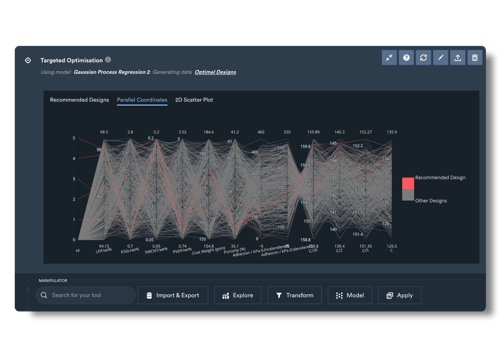On-Demand Webinar
Multi-Objective LFP Cathode Design
Combining DoE Methodology with Machine Learning to Accelerate Battery Development
Who should watch?
Materials scientists wanting to leverage existing test data for smarter electrode formulations
Technical leaders aiming to accelerate battery development through machine learning integration
R&D teams looking to replace trial-and-error testing with data-driven material optimisation
Battery engineers struggling with lengthy cathode development cycles and resource constraints
This technical webinar shows battery cell developers how to use machine learning to identify optimal electrode materials with fewer tests, transforming historical test data into precise recommendations for your next campaign.
The Optimal Cathode Recipe is Hidden Among Millions of Parameter Combinations
Modern cathode development requires balancing multiple competing objectives that traditional approaches struggle to optimise efficiently:
- Finding ideal ratios between active material, binders, and conductive additives
- Maximising energy density while maintaining mechanical stability
- Reducing development cycles without compromising performance
We'll examine how machine learning approaches can enhance DoE methodologies by identifying promising formulation regions more efficiently, helping development teams focus their testing resources on the most promising cathode compositions for specific performance targets.
Continue Testing Randomly or Rely on Intuition? Both Lead to Suboptimal Results
Most labs fall into one of two traps: relying heavily on intuition and experience, or employing systematic but inefficient Design of Experiments approaches.
Meanwhile, testing equipment runs suboptimal tests while development timelines stretch and budgets strain. The data you've already collected contains valuable insights that remain untapped.
A Smarter Approach: Data-Driven Test Recommendations for Cathode Optimisation
In this webinar, we'll demonstrate how Monolith's Next Test Recommender transforms your existing test data into a strategic advantage. You'll learn:
- Smart Test Planning: How to ensure each test delivers maximum information gain toward your performance targets
- Data-Driven Material Selection: Techniques for identifying specific cathode compositions to prioritise
- Technical Demonstration: A walkthrough showing the workflow from raw data to actionable recommendations
Watch On-demand Webinar Now

The Adoption Journey: From Manual Testing to AI-Powered Cathode Development
Wondering how to transform your battery testing operations with AI? We'll walk through a practical implementation roadmap spanning multiple years:
- Year 1: Enhancing manual test labs with optimised planning
- Year 2: Scaling to high-throughput operations with AI-guided testing
- Year 3: Transferring insights to manufacturing processes
- Year 4: Creating continuous improvement through field data integration
During the webinar, we'll briefly explore each stage and show how battery manufacturers are implementing this approach to achieve faster development cycles with fewer resources.
Technical Coverage:
- Advanced Electrode Data Validation: Techniques for analysing battery test data to reveal hidden patterns
- Algorithm Evaluation for Material Science: Comparing machine learning models to efficiently navigate your design space
- Implementation with Manufacturing Constraints: Translating algorithm outputs into practical cathode recipes
- Closed-Loop Testing Methodology: Incorporating each new test result to create an intelligent feedback loop
Join us to learn how leading battery developers are reducing testing cycles while discovering better performing materials. Transform your testing strategy from trial-and-error to targeted exploration guided by data-driven intelligence.
If you are unable to attend the live session, we would still encourage you to register to receive the webinar recording.




